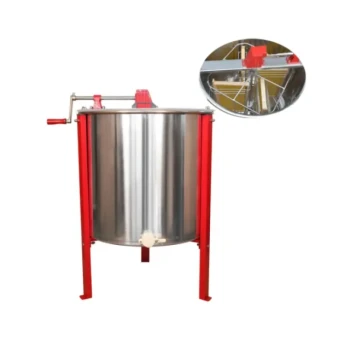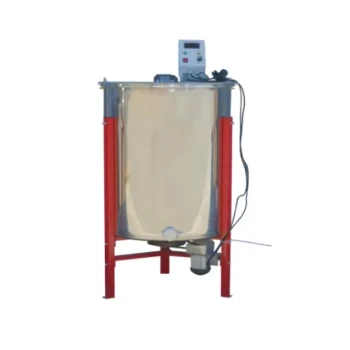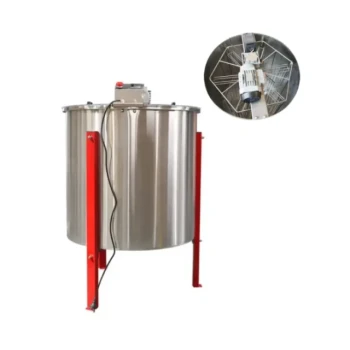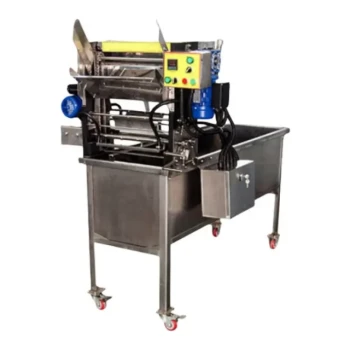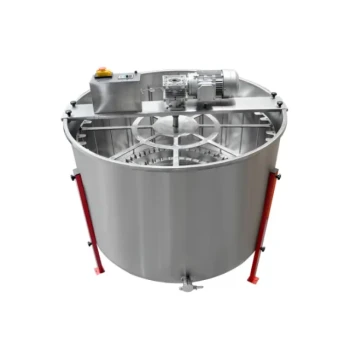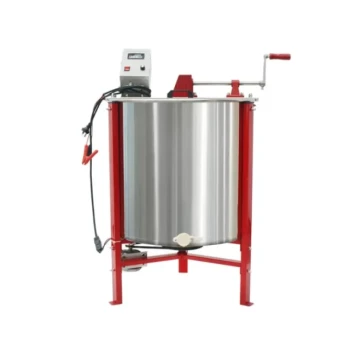The primary advantages of a tangential honey extractor are its gentle handling of combs and its affordability. This design excels at protecting delicate, old, or fragile wax from damage during the spinning process. For new beekeepers or those with a small number of hives, it represents the most accessible and cost-effective entry point into mechanical honey extraction.
A tangential extractor prioritizes the preservation of honeycomb integrity over raw extraction speed. This makes it an ideal choice for beekeepers with fragile combs or smaller operations where the manual effort is an acceptable trade-off for lower cost and superior comb safety.
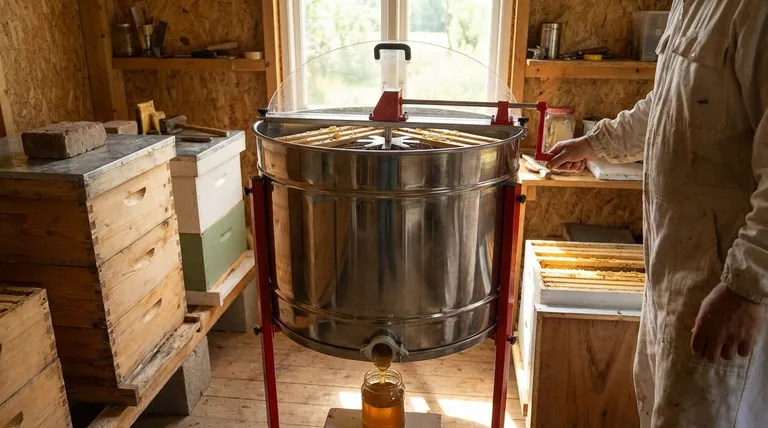
Why Choose a Tangential Extractor?
The decision to use a tangential extractor is rooted in a specific set of priorities that favor comb health and budget over speed and volume.
Superior Comb Protection
A tangential extractor holds the frame flat against the inner wall of the drum. As it spins, centrifugal force is applied evenly across the face of the comb.
This method is significantly gentler than other designs, making it the best option for combs that are new, brittle with age, or not fully drawn out. Preserving the comb saves the bees immense time and energy, as they can immediately begin refilling it rather than rebuilding it from scratch.
Cost-Effectiveness for Beginners
For hobbyists and small-scale beekeepers, the initial investment in equipment is a major consideration. Tangential extractors are typically the most affordable models on the market.
This lower price point provides a functional and effective way to harvest honey without the significant upfront cost of larger, more complex machines.
Smaller, Manageable Footprint
Tangential extractors, especially those designed for 2-4 frames, are often smaller and lighter than their radial counterparts. This makes them easier to move, operate, and store in limited spaces like a garage or shed.
Understanding the Trade-offs
While gentle and affordable, the tangential design comes with a significant trade-off in efficiency and labor.
The Manual Flipping Process
The core limitation is that this design only extracts honey from one side of the frame at a time—the side facing outward.
To extract all the honey, you must spin the frames, stop the extractor, manually remove each frame, turn it around, re-insert it, and then spin the machine a second time.
Slower Extraction Speed
The two-step process of spinning and flipping naturally makes tangential extraction slower than other methods.
This is perfectly manageable for a beekeeper with a few hives, but it can quickly become a bottleneck for anyone harvesting a large number of frames.
Limited Capacity
Most tangential extractors are designed to hold between 2 and 9 frames. This smaller capacity, combined with the need to flip frames, limits the volume of honey you can process in a single day.
Manual vs. Electric: A Key Distinction
The "tangential" design refers to how the frame is oriented, not how the machine is powered. Both manual and electric options exist.
Hand-Crank Models
Hand-crank extractors are the simplest and most affordable. The beekeeper provides all the power for spinning. This is a perfectly viable option for someone with just one or two hives.
Electric Models
An electric motor removes the physical labor of spinning the frames, which increases convenience and efficiency. However, even with an electric tangential extractor, you still have to stop the process to manually flip the frames.
Making the Right Choice for Your Apiary
Your ideal extractor depends entirely on the scale of your operation and what you value most in the process.
- If your primary focus is budget and you have 1-3 hives: A manual, tangential extractor offers the best value while protecting your valuable combs.
- If your primary focus is protecting old or fragile comb: The tangential design is inherently gentler and the safest choice, regardless of whether it's a manual or electric model.
- If your primary focus is efficiency and you have more than 5 hives: You should strongly consider a radial extractor, as the time saved by not flipping frames becomes significant at scale.
Choosing the right tool ensures your honey harvest is a rewarding process, not a frustrating chore.
Summary Table:
| Advantage | Key Benefit | Ideal For |
|---|---|---|
| Superior Comb Protection | Gentle spinning protects fragile, new, or old comb. | Beekeepers prioritizing comb health. |
| Cost-Effectiveness | Most affordable extractor type on the market. | Hobbyists and small-scale beekeepers. |
| Small Footprint | Compact and easy to store or move. | Beekeepers with limited space. |
| Trade-off: Manual Flipping | Requires frames to be manually flipped to extract both sides. | Smaller operations where speed is less critical. |
Ready to Choose the Perfect Extractor for Your Honey Harvest?
At HONESTBEE, we supply commercial apiaries and beekeeping equipment distributors with the durable, high-performance tools they need to succeed. Whether you're a large-scale operation or a growing distributor, our wholesale-focused operations ensure you get the right equipment at competitive prices.
Let our expertise guide you to the most efficient and cost-effective solutions for your honey processing needs. Contact our wholesale team today to discuss your requirements and get a quote!
Visual Guide
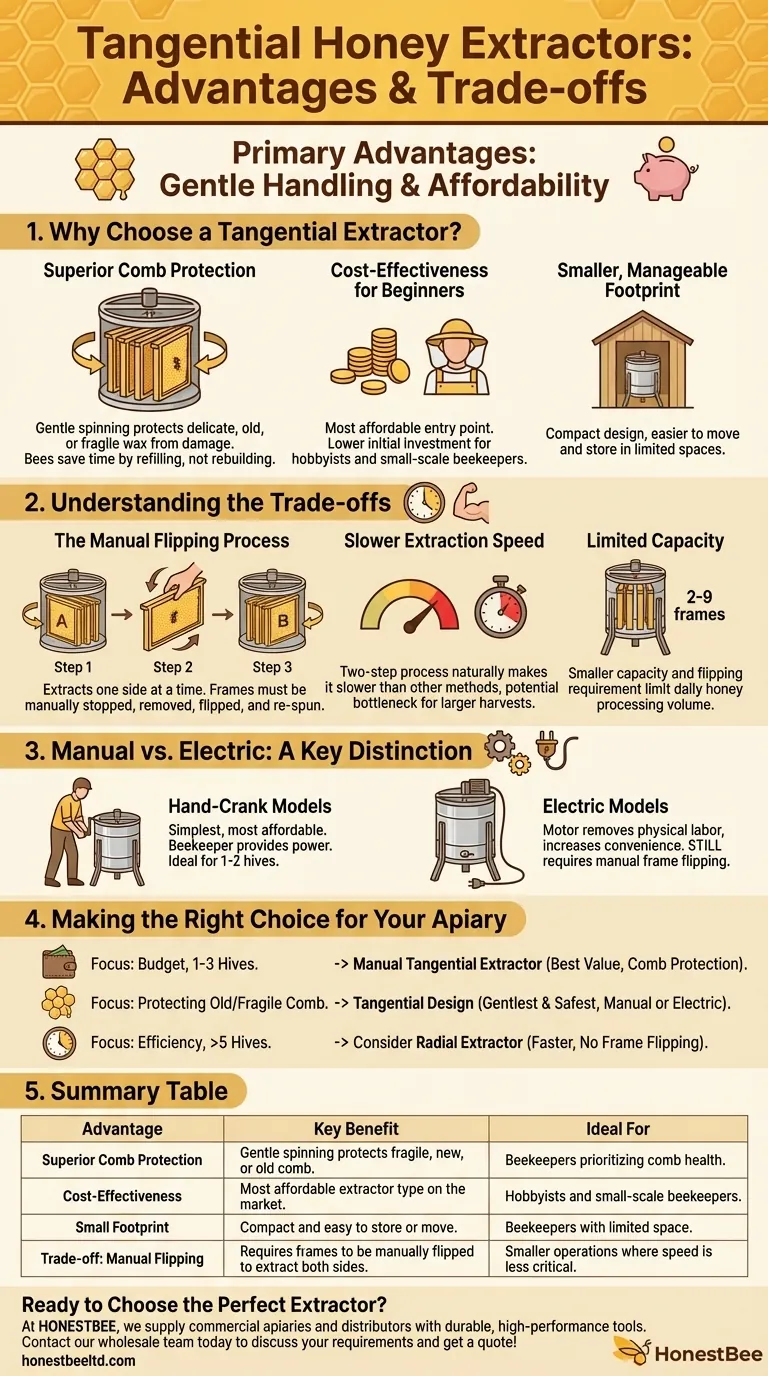
Related Products
- Stainless Steel Manual 8 Frame Radial Honey Extractor Machine for Beehives
- 2 Frame Stainless Steel Manual Honey Spinner Extractor for Beekeeping
- 6 Frame Manual Stainless Steel Honey Extractor Beekeeping Equipment
- HONESTBEE 72 Frame Industrial Electric Honey Extractor for Beekeeping
- HONESTBEE 3-Frame Manual Acrylic Honey Extractor
People Also Ask
- How does honey extraction and filtration equipment contribute to increasing the market value of honey? Boost Your ROI
- What is the core function of a honey extraction unit? Professional Honey Houses for High-Quality Yields
- How do manual honey extractors compare to electric honey extractors? Choosing the Right Tool for Your Apiary Growth
- What is the necessity of cleaning honey extraction machinery? Ensure Pure Quality & Microbial Compliance
- What equipment configuration is used for gravity-based honey extraction? Simple Low-Cost Tools for the Crush-and-Strain Method
- How does a tangential honey extractor operate? Master the 3-Step Sequence for Perfect Comb Preservation
- What is the primary function of high-capacity honey extractors? Maximize Yield During Peak Nectar Flow
- What is the impact of using an industrial-grade honey extractor on pollen content? Efficiency vs. Botanical Richness





